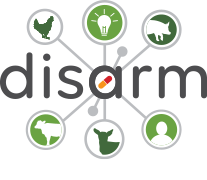In this section
In this section
Feed Composition, Additives and Supplements
Feed composition is another key element in safeguarding animal health and welfare in livestock production. Diet must be adapted for the age of the animal, as nutritional requirements change as they mature and develop.
Animal feeds can be formulated with special ingredients like additives, supplements and active feed ingredients that can assist in supporting the animals’ (gut) health and immune function. These come in various forms:
- Prebiotics: feed compounds which stimulate the growth of beneficial commensal gut bacteria by providing substrate to grow on to help maintain a healthy population of gut microbiota. These include dietary fibres such as plant-based oligosaccharides like fructans and galactans, resistant starch, beta-glucans, and xylooligosacharides.
- Enzymes: these are mostly proteins that speed up chemical reactions. Enzymes are added to animal feed to support the digestion of feed stuffs that are difficult to digest or totally indigestible by the animals’ natural digestive enzymes. The products they produce, and the consequent promotion of microbial populations can help modulate the immune status of the animal.
- Antimicrobial peptides: a diverse class of naturally occurring molecules that are produced by all multicellular organisms as part of the innate immune response as a first line of defence against pathogens. These molecules can directly kill bacteria, yeasts, fungi, viruses and even cancer cells.
- Chitosan: a naturally present linear polysaccharide with antimicrobial action which is produced from the exoskeleton of crustaceans.
- Lysozyme: an enzyme that degrades the cell wall of gram-positive bacteria causing them to disintegrate. Lysozymes are part of the innate immune response and are naturally present in eggs, tear fluids, mucus, blood, and are produced by leukocytes.
- Medium chain fatty acids/triglycerides: organic acids which have been shown to be able to kill bacteria, but the mechanism for this is not yet fully understood. It is likely that the acids alter the permeability of bacterial cells or alter the pH inside the bacterial cells.
- Plant extracts or phytogenics: These include plant-derived bio-active compounds, natural growth promoters and essential oils which can help reduce the pathogenicity and virulence of microbes and modulate inflammation and immunity responses in animals.

